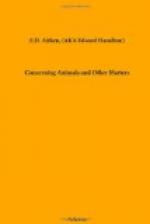On a level place a little below the fort stood two monuments, telling of the days when the Honourable East India Company maintained a “Resident” at this place. Here he lived in proud solitude, upholding the British flag. But his wife and the little one on whose face he had not yet looked were on their way from Bombay in a native “pattimar” to join him, and as he stood gazing over the sea at the red setting sun one 5th of October, he thought of the glad to-morrow and the end of his dreary loneliness. It fell to him to put up one of these monuments, with a sorrowful inscription to all that was left to him on the following morning, the “memory” of a beloved wife and an infant thirty-one days old, drowned in crossing the bar on October 6, 1853.
We have strewed our best to the weeds
unrest,
To the shark and the sheering gull.
If blood be the price of admiralty,
Lord God, we ha’ paid in full.
I carried my gun and rifle with me in my yacht. They served to keep up my character as a sportsman, and did not often require to be cleaned. So the morning calm of my mind was lashed into an unwonted tempest of excitement when my jolly skipper, Sheikh Abdul Rehman, came in and told me briefly that a “bag” (which word does not rhyme with rag, but must be pronounced like barg without the r and signifies a tiger or panther) had killed a cow in the village the night before last.
When he added that the villagers had set a spring gun for it last evening and it had returned to the “kill” and been badly wounded, my excitement was turned into wrath. I had been at anchor here all yesterday. The Indian ryot everywhere turns instinctively to the sahib as his protector against all wild beasts. What did these men mean by keeping their own counsel and setting an infernal machine for their enemy? Abdul Rehman explained, and the explanation was simple and sufficient. My fat predecessor in the appointment that I held had no relish for sport and kept no guns, so the simple villagers, when they saw my boat with its familiar flag, looked for no help from that quarter. However, I might still win renown off that wounded “bag,” if it was not a myth; but, to tell the truth, I was sceptical. The tiger and the panther are not nomads on rocky plains, like the antelope. I landed, notwithstanding, promptly and visited the scene. Sure enough, there was a young heifer lying on its side, with the unmistakable deep pits where the jaws of the panther had gripped its throat, and a gory cavity where it had selected a gigot for its dinner.
Round the corpse the villagers had arranged a circular fence of thorns, with one opening, across which they had stretched a cord, attached at the other end to the trigger of an old shooting iron of some sort, charged with slugs and looking hard at the opening. The gun had gone off during the night, and the ground was soaked with blood. A few yards off there was another great swamp of blood. The beast had staggered away and lain down for a while, faint and sick. Then it had got up and crawled home, still dripping with blood, by which we tracked it for a good distance, but the trace grew gradually fainter and at last ceased altogether.




